Key takeaways:
- Project-Based Learning (PBL) emphasizes real-world engagement, critical thinking, and collaboration, transforming how students connect with the subject matter.
- Key principles of PBL include student agency, real-world connection, collaboration, and an iterative learning process focused on growth and flexibility.
- Challenges in PBL involve time management, group dynamics, and unpredictability, highlighting the importance of communication and adaptability for successful project implementation.
- Reflection, fostering a growth mindset, and allowing student choice in project topics enhance learning experiences and deepen engagement.
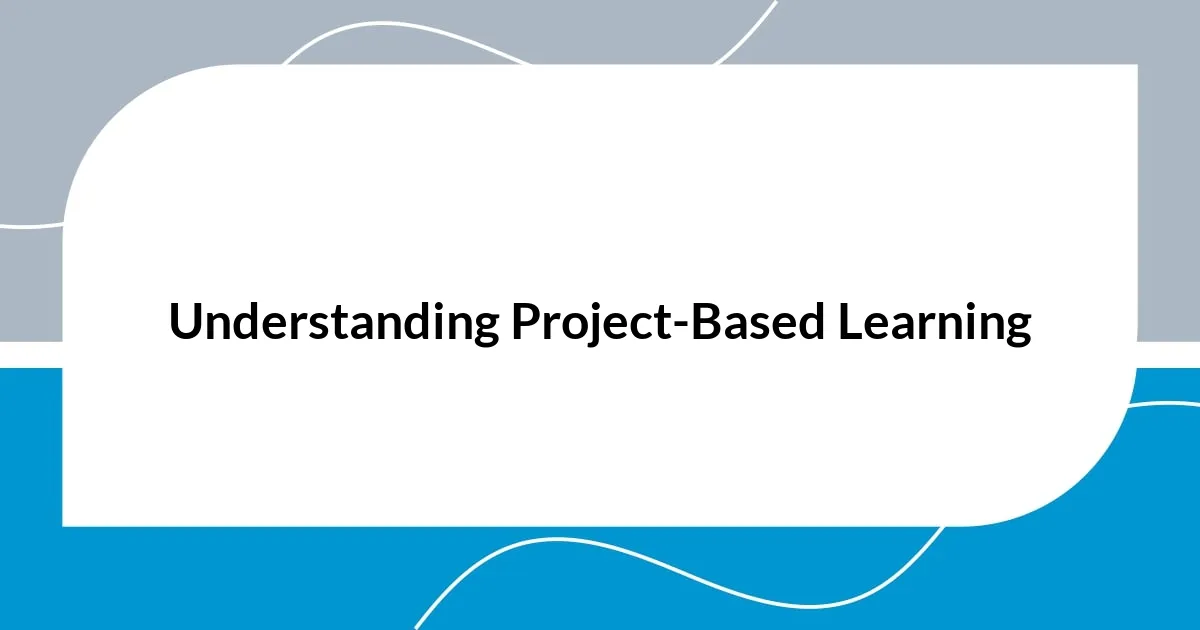
Understanding Project-Based Learning
Project-Based Learning (PBL) is an innovative teaching method where students engage in real-world projects that require critical thinking and collaboration. I vividly recall my first encounter with PBL in college; working on a sustainability project pushed me to not only learn about environmental issues but also to connect with my peers in ways I never imagined. Isn’t it fascinating how hands-on activities can transform our understanding?
In PBL, the emphasis is placed on inquiry and exploration rather than rote memorization. I remember feeling a rush of excitement when I could choose my own topic and dive deep into research. It’s like a puzzle, where each piece contributes to a bigger picture; with each finding, I felt more invested in the outcome. How empowering it is to take charge of your own learning journey!
Another key element of PBL is the focus on reflection and feedback. After completing my project, I was encouraged to assess my performance and share insights with my peers. This not only reinforced my learning but also fostered a supportive environment where we could grow together. Have you ever considered how feedback shapes our understanding and helps us to refine our skills? It’s a game-changer that enhances both personal and academic growth.
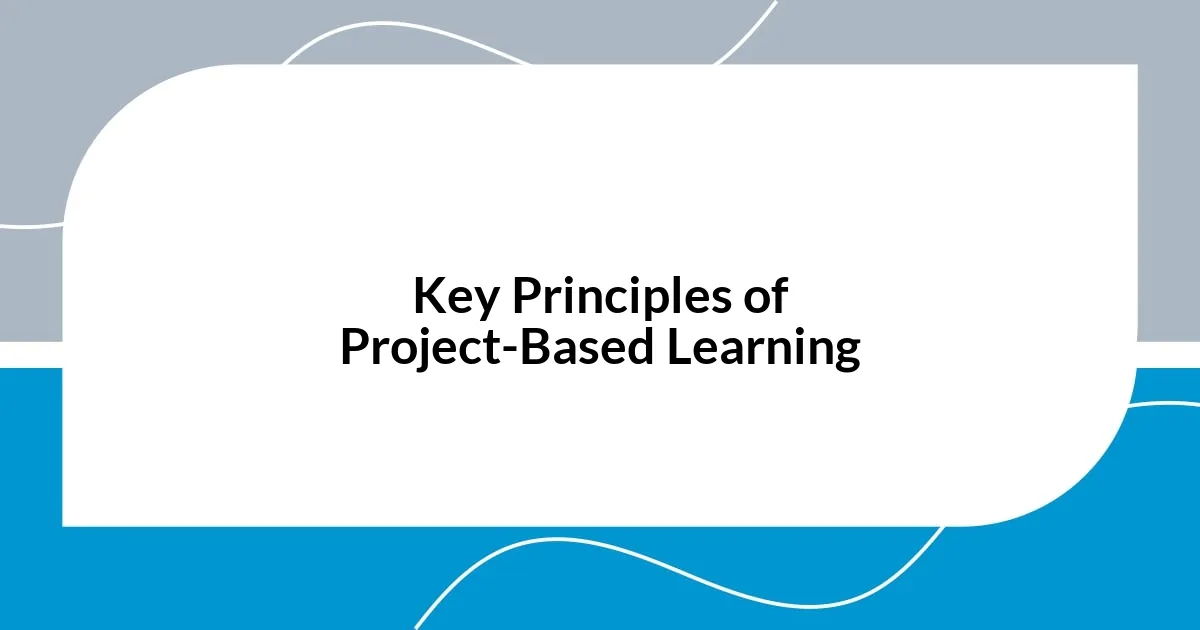
Key Principles of Project-Based Learning
One of the key principles of Project-Based Learning is student agency, which empowers learners to take ownership of their projects. I remember participating in a community service initiative where we identified local needs and crafted a proposal to address them. The feeling of autonomy in designing our approach not only fueled my passion but also instilled a deeper sense of responsibility toward our community. This principle is transformative, as it cultivates a genuine investment in the learning process.
Here are some essential principles underpinning PBL:
- Real-World Connection: Projects are tied to authentic problems or questions, making learning relevant and relatable.
- Collaboration: Students work together, sharing ideas, and leaning on each other’s strengths, which fosters teamwork skills.
- Interdisciplinary Approach: PBL transcends subject boundaries, encouraging students to make connections across different areas of knowledge.
- Iterative Process: Learning is viewed as a cycle involving exploration, feedback, and revision, promoting ongoing development.
- Assessment for Learning: Evaluation focuses on student growth by emphasizing the process rather than just the final product.
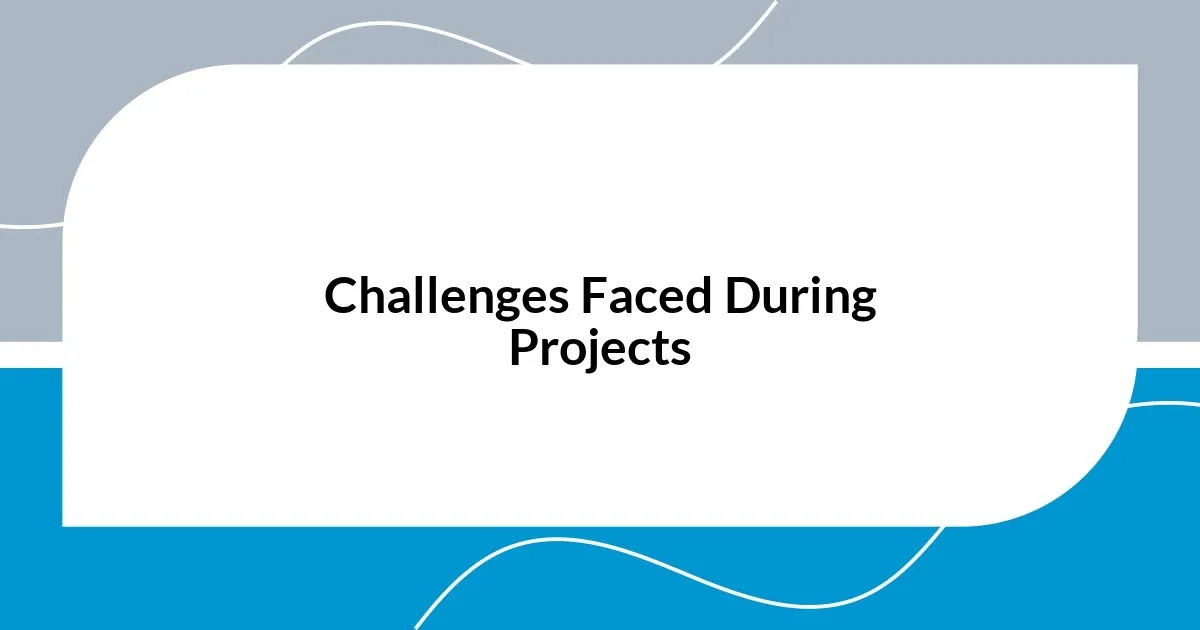
Challenges Faced During Projects
During my time with project-based learning, I encountered some significant challenges that tested my resilience. One of the main hurdles was managing time effectively. There were instances when I bit off more than I could chew, thinking I could tackle multiple tasks at once. When deadlines loomed, I found myself grappling with the stress of unfinished work. Have you ever felt that pressure? It can be overwhelming, but I learned that breaking down tasks into manageable steps made a world of difference.
Another challenge I faced was the dynamics of group work. While collaboration can lead to fantastic outcomes, it can also bring differing opinions and conflicting schedules to the forefront. I remember during a project on renewable energy, disagreements about our approach caused tension within the team. It pushed me to develop better communication skills and embrace compromise, which ultimately strengthened our final presentation. Have you had moments where teamwork didn’t go as planned? Those experiences truly teach us about patience and the importance of listening.
Lastly, the unpredictability of the project process itself posed another layer of difficulty. Often, we would encounter unexpected obstacles that required quick thinking and adaptability. For example, during a research project, crucial data we needed was suddenly unavailable. I had to shift gears and find alternative sources, which initially felt daunting, but in hindsight, it became an opportunity to explore aspects I would have otherwise overlooked. It’s moments like these that cultivate flexibility and problem-solving skills, wouldn’t you agree?
| Challenge | Personal Insights |
|---|---|
| Time Management | Breaking tasks down reduced stress significantly. |
| Group Dynamics | Learning to listen and compromise strengthened our teamwork. |
| Unpredictability | Adaptability turned obstacles into unexpected learning experiences. |
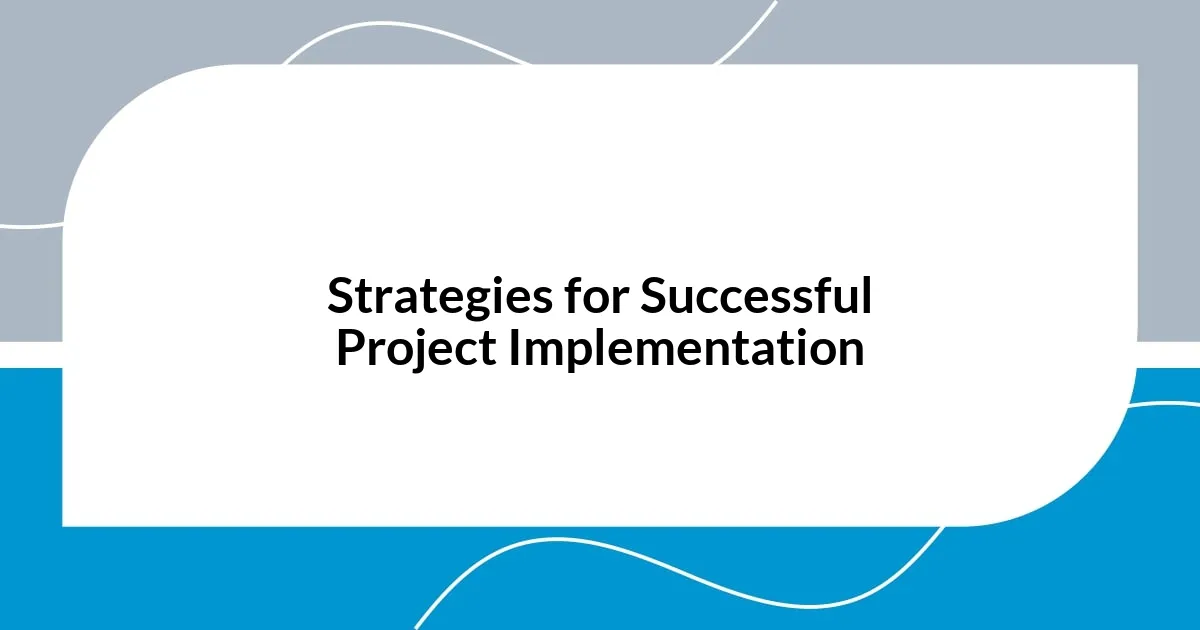
Strategies for Successful Project Implementation
A key strategy for successful project implementation in PBL is clearly defining roles within the group. I’ve seen firsthand the benefits of assigning specific tasks based on each member’s strengths. For instance, during a project focused on local history, I took on the research role while others handled visualization and presentation. This division not only minimized confusion but also encouraged a sense of ownership in our respective areas. Have you ever noticed how much smoother a project goes when everyone knows exactly what their responsibilities are?
Communication is another critical strategy I encountered. Establishing regular check-ins and updates among team members kept everyone aligned and motivated. There was this one project where we initially left communication to chance. It didn’t take long for us to realize that without consistent dialogue, misunderstandings crept in. Once we implemented weekly meetings, I noticed an increase in enthusiasm and shared ideas. Have you found that open channels of communication can change the dynamics of group work?
Finally, celebrating small victories throughout the project can significantly boost morale and engagement. I remember feeling a rush of excitement when we completed each phase of our project, whether it was finishing a draft or receiving positive feedback from our peers. Recognizing those milestones not only kept our spirits high but also reinforced our commitment to seeing the project through to completion. Have you experienced that energizing effect that comes from acknowledging achievements, no matter how small?
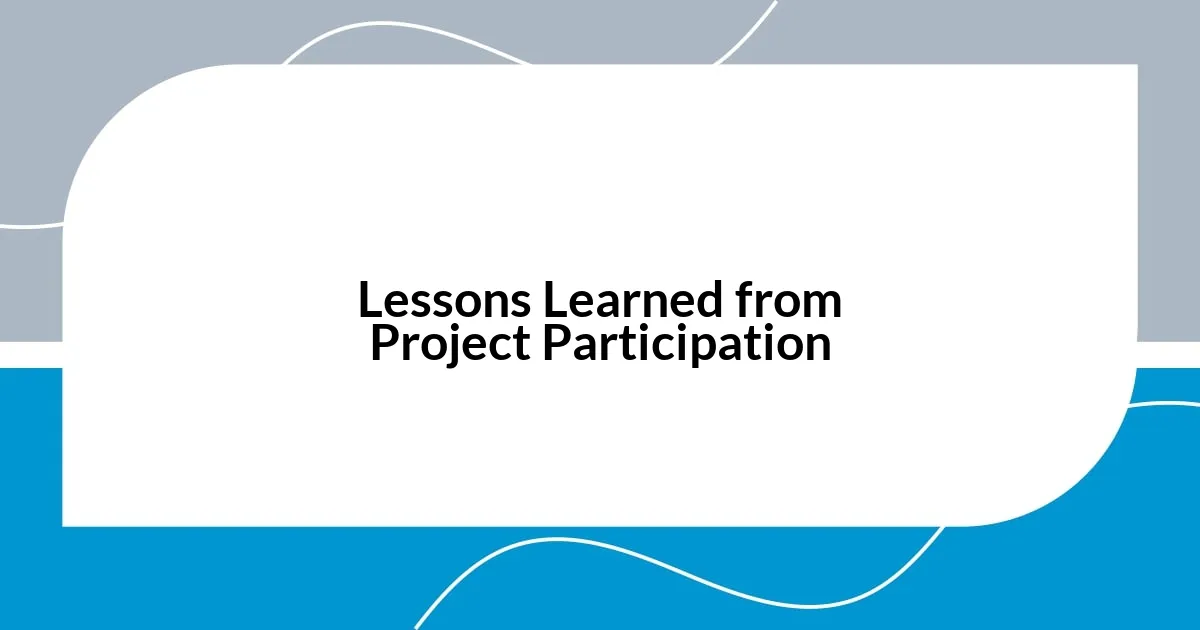
Lessons Learned from Project Participation
Participating in projects taught me that flexibility is crucial. There was a time when I was deeply invested in a project about sustainable agriculture. We had a well-laid plan, but when our main speaker canceled just days before the presentation, I felt a wave of panic. Instead of shutting down, we rallied together and brainstormed alternatives. In that moment, I realized that the ability to adapt can often lead to innovative solutions that we wouldn’t have considered otherwise. Have you ever had to pivot unexpectedly? It’s a challenging yet empowering experience.
Another lesson I gleaned from my project participation was the importance of setting realistic expectations. I recall one project where I ambitiously set out to achieve more than what was feasible within our timeline. As deadlines approached, that enthusiasm turned into stress. Looking back, I recognize that establishing clear, achievable goals from the start would have alleviated much of the pressure. How often do we overlook this simple yet vital step in pursuit of our ambitions? It’s something I’ll always keep in mind for future projects.
Finally, I discovered that trust within the team is invaluable. Early on, during a group project about environmental policy, I felt hesitant to share my ideas, fearing rejection. But as we built rapport, I learned that vulnerability can foster trust and collaboration. When I eventually voiced my thoughts, the team embraced them wholeheartedly. It was a breakthrough! That experience reinforced for me the notion that a supportive environment allows creativity to flourish. Have you experienced a turning point in teamwork where trust shifted the dynamic? It’s remarkable how trust can transform a project from a task into a shared journey.
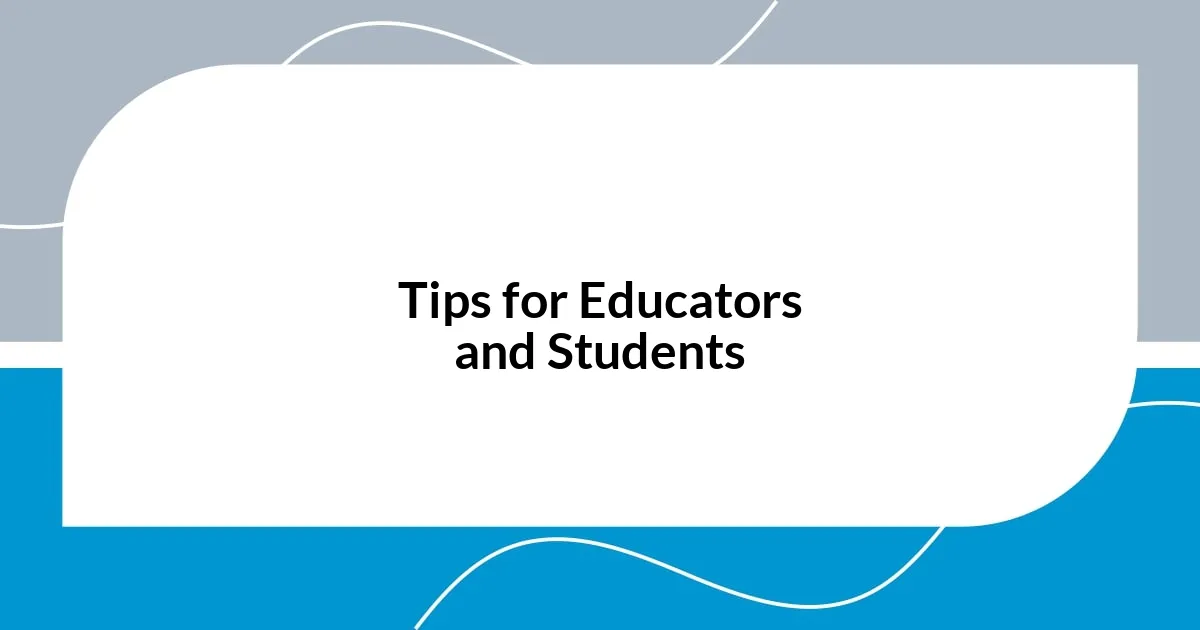
Tips for Educators and Students
One tip I find invaluable is to prioritize reflection throughout the project. After wrapping up a significant project on community service, my team took time to discuss what went well and what could be improved. This practice not only provided closure but also illuminated lessons that fueled our growth for the next endeavor. Have you ever taken a moment to look back and evaluate your journey? It can be quite enlightening.
Another aspect I emphasize is fostering a growth mindset. I remember diving into a technical project that felt way beyond my skill level. Instead of shying away from challenges, I embraced them and sought help when needed. This experience taught me that viewing obstacles as opportunities can transform anxiety into excitement. How do you approach difficulties in projects? Shifting your perspective can really make a difference.
Lastly, I advocate for incorporating student choice in project topics. I once participated in a project where each member picked a theme that mattered personally to them. My topic was mental health awareness, and the passion I felt translated into a more engaging presentation. Letting learners choose not only ignites their enthusiasm but also promotes deeper investment in the outcome. Have you noticed how personal connections to a subject can enhance learning? It’s amazing what a little autonomy can do for motivation.